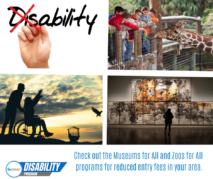Disabled Not Unable: Lions, Tigers, and Bears!

Some of the greatest adventures in life are exploring other cultures, food, history, and wildlife. These activities can be harder to do with a disability and may seem daunting at times. But all these things can be done without ever having to leave the US or even your state! Museums, zoos, and aquariums are all portals to another place and time. You do not have to go all the way to Africa to come face to face with the long purple tongue of a giraffe or face the dreary cold of Northern Europe to experience the beauty of Van Gogh. The gift of adventures is they are what you make them.
For me, few things beat a trip to the Cincinnati zoo: trying to catch a peacock, seeing a rare Indian rhino, and coming nose to nose with Fiona the hippo. You can’t forget a Skyline cheese coney and a cup of Graeter’s ice cream to finish out the trip.
Discounts
Planning a trip to a museum, zoo, or aquarium may seem out of the question because of the expense. Fortunately, there are several amazing programs that provide families with free or reduced cost.
Museums for All is a program for individuals receiving food assistance (SNAP) and their families to get entry into over 1,200 museums throughout the US for $3 or less per person. All you need to do is present your EBT card and photo ID. You can find participating museums here.
Zoos for All is the companion program to Museums for All and provides entry to zoos across the country for families receiving food assistance for $3 or less per person. You will need to check directly with your local zoo to see if they are participating in the program. Zoos and aquariums not participating in the program typically offer a discounted disability price or provide free entry to a personal care attendant. Some zoos and aquariums also have certain days of the week that are free entry for everyone.
Accessibility
Accessibility is a key factor to any adventure for individuals living with HD, or any other disabling conditions. Modern zoos and aquariums have truly amazing accessibility programs and options that can include:
- Wheelchair accessibility
- Wheelchair rentals
- Calming rooms
- Calm spaces
- Sensory bags
- Adult changing tables
- Sign language interpreters with two weeks’ notice
Museums, on the other hand, are not created equally when it comes to accessibility, which is often due to their status as historical landmarks. Museums are required to be wheelchair accessible, but not all exhibits may be accessible. The best way to plan a museum visit is to call guest services or visitor services and discuss options.
Contact Us
If you have questions, you can always Ask Allison!

